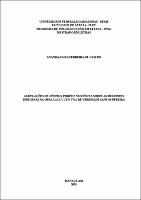| ???jsp.display-item.social.title??? |


|
Please use this identifier to cite or link to this item:
https://tede.ufam.edu.br/handle/tede/11322| ???metadata.dc.type???: | Dissertação |
| Title: | As relações de gênero, poder e violência sobre as mulheres indígenas na obra Um rio sem fim, de Verenilde Santos Pereira |
| ???metadata.dc.creator???: | Castro, Ananda Raira Ferreira de  |
| ???metadata.dc.contributor.advisor1???: | Zucolo, Nicia Petreceli |
| ???metadata.dc.contributor.referee2???: | Salorte, Luciane Maria Legeman |
| ???metadata.dc.contributor.referee3???: | Costa, Yasmin Serafim da |
| ???metadata.dc.description.resumo???: | Partindo do pressuposto de que a literatura tem como função promover discussões político-sociais, essa pesquisa tem como propósito analisar as relações de gênero, poder e violência sofridas por algumas personagens mulheres na obra Um rio sem fim, da escritora afro-indígena Verenilde Pereira, a partir da edição de 1998. A história brasileira, por muito tempo, descreveu as relações entre indígenas e colonizadores, representadas, obviamente, pela perspectiva eurocêntrica. Esse processo determinou um imaginário composto por mulheres indígenas estereotipadas e subservientes, e a essa subserviência se opõe o romance de Verenilde, partindo da ótica das mulheres indígenas e afro-indígena, passando pela percepção de outras mulheres, evidenciando as marcas do discurso eurocêntrico. Na narrativa, enredada pelo caráter testemunhal, a autora centraliza na história quatro meninas, sendo elas Rosa Maria, Maria Assunção, Maria Índia e Maria Rita, que são envolvidas e sucumbidas pelas relações de gênero, poder e violência no cenário pós-colonial, em especial, no Amazonas. A análise das relações de gênero, poder e violência serão feitas a partir e concomitantemente às vozes narrativas, ao tempo e ao espaço que compõem a história de Maria Assunção, Rosa Maria e Laura Dimas, passando ainda por Mariana e irmã Isabel. Para a análise dos aspectos narrativos, serão utilizadas referências dentro dos campos literários e linguísticos; enquanto que para análise das problemáticas sociais, referências das áreas da histórica, sociologia, filosofia e psicologia. A análise nos permitiu visualizar a literatura como ferramenta de denúncia social, posto que a autora estabeleceu, a partir de sua obra, uma crítica que subverte a lógica eurocêntrica. A partir do domínio da linguagem, os elementos narrativos escapam ao prisma colonial, e as vozes que ecoam na história apresentam uma perspectiva decolonial acerca das relações de gênero poder e violência que marcaram e marcam a vida das mulheres amazônidas. |
| Abstract: | Assuming that literature serves the function of promoting political and social discourse, this research aims to analyze the intersections of gender, power, and violence experienced by several female characters in the novel Um rio sem fim by the Afro-Indigenous writer Verenilde Pereira, based on the 1998 edition. For a long time, Brazilian history has portrayed the relationships between Indigenous peoples and colonizers predominantly through a Eurocentric lens. This narrative has fostered an imaginary filled with stereotyped and subservient Indigenous women. In contrast, Verenilde’s novel challenges this imposed subservience by adopting the perspective of Indigenous and Afro-Indigenous women, as well as through the viewpoints of other female characters, highlighting the enduring marks of Eurocentric discourse. In the narrative, woven with a testimonial character, the author focuses the story on four girls—Rosa Maria, Maria Assunção, Maria Índia, and Maria Rita—who are involved in and succumb to the relationships of gender, power, and violence in the post-colonial setting, particularly in the Amazon. The analysis of gender, power, and violence will be conducted in conjunction with an examination of narrative voices, temporality, and spatiality that shape the stories of Maria Assunção, Rosa Maria, and Laura Dimas, while also engaging with the trajectories of Mariana and Sister Isabel. To examine the narrative aspects, this study will draw on references from literary and linguistic fields, while the investigation of social issues will be grounded in historical, sociological, philosophical, and psychological frameworks. This analysis allows us to understand literature as a tool for social denunciation, as the author constructs a critique that subverts the Eurocentric logic through her work. Through the mastery of language, the narrative elements transcend the colonial prism, and the voices that emerge throughout the story offer a decolonial perspective on the gendered power relations and violence that have historically impacted—and continue to impact—the lives of Amazonian women. |
| Keywords: | Violência contra as mulheres |
| ???metadata.dc.subject.cnpq???: | LINGUISTICA, LETRAS E ARTES:LETRAS |
| ???metadata.dc.subject.user???: | Discurso decolonial Dominação masculina Necropolítica Estudos culturais |
| Language: | por |
| ???metadata.dc.publisher.country???: | Brasil |
| Publisher: | Universidade Federal do Amazonas |
| ???metadata.dc.publisher.initials???: | UFAM |
| ???metadata.dc.publisher.department???: | Faculdade de Letras |
| ???metadata.dc.publisher.program???: | Programa de Pós-graduação em Letras |
| Citation: | CASTRO, Ananda Raira Ferreira de. As relações de gênero, poder e violência sobre as mulheres indígenas na obra Um rio sem fim, de Verenilde Santos Pereira. 2025. 101 f. Dissertação (Mestrado em Letras) - Universidade Federal do Amazonas, Manaus (AM), 2025. |
| ???metadata.dc.rights???: | Acesso Aberto |
| ???metadata.dc.rights.uri???: | https://creativecommons.org/licenses/by-nc-nd/4.0/ |
| URI: | https://tede.ufam.edu.br/handle/tede/11322 |
| Issue Date: | 11-Sep-2025 |
| Appears in Collections: | Mestrado em Letras |
Files in This Item:
| File | Description | Size | Format | |
|---|---|---|---|---|
| DISS_AnandaCastro_PPGL | 895.75 kB | Adobe PDF |  Download/Open Preview |
Items in DSpace are protected by copyright, with all rights reserved, unless otherwise indicated.




